Ann Lethbridge's Blog, page 6
November 30, 2015
Brighton Revisited 2
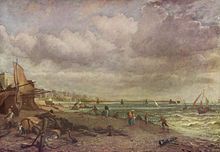 Oddly enough, the Brighton Pavilion and Prinny's antics made little impression on my m-i-l. The highlight of her youth were her friends, the beach and swimming in the sea. She regularly swam from the Palace Pier (now the only remaining pier) to the West Pier. The swim between the two piers was 1500 meters or roughly a mile and there was an annual race, which was likely her impetus for swimming there and back. Neither of these piers were in situ during the Regency.
Oddly enough, the Brighton Pavilion and Prinny's antics made little impression on my m-i-l. The highlight of her youth were her friends, the beach and swimming in the sea. She regularly swam from the Palace Pier (now the only remaining pier) to the West Pier. The swim between the two piers was 1500 meters or roughly a mile and there was an annual race, which was likely her impetus for swimming there and back. Neither of these piers were in situ during the Regency. However, there was a pier (designed by Captain Samuel Brown, RN) built in 1823 in Brighton, during the reign of George IV. This is John Constable's rendition of Brighton beach, with the Royal Suspension Chain pier in the background.
I love this picture of the beach, the wind and waves, the people walking, the fisherman in the foreground. It is easy to imagine what Brighton was like in the time we are interested in.
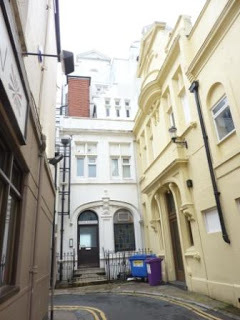
This is Stein Street (as against old Stein). A tricky corner if ever there was one. We can imagine a Regency Hero trying to navigate this in his curricle with all the widows and young ladies looking on.
And in case you are imagining golden sands, here is the beach. It
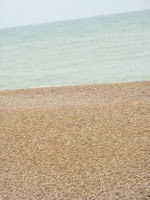 is in fact golden pebbles.
is in fact golden pebbles.More to come.
Published on November 30, 2015 08:00
November 26, 2015
Happy Thanksgiving
Published on November 26, 2015 03:46
November 23, 2015
Brighton Revisited
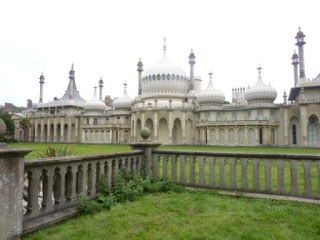 The Royal Pavilion at Brighton stands out as an icon in the world of Regency fiction. Brighton became the place for the haute ton in the summer with its libraries, Assembly Rooms, sea bathing and promenading all under the eye of the Prince of Wales. If you were in with the in crowd, then you would also be invited to a ball a the Pavilion.
The Royal Pavilion at Brighton stands out as an icon in the world of Regency fiction. Brighton became the place for the haute ton in the summer with its libraries, Assembly Rooms, sea bathing and promenading all under the eye of the Prince of Wales. If you were in with the in crowd, then you would also be invited to a ball a the Pavilion.It was here that Princess Charlotte and Prince Leopold spent time together before Prinny gave his assent to their engagement. Some of that story, you can find in my short story, Princess Charlotte's Choice.
But that is not the only reason Brighton means a great deal to me. My very dear mother-in-law, while not born here, grew up here. Later my husband spent many happy childhood holidays on Brighton Beach while staying at his grandmother's boarding house.
So this particular visit to Brighton was not only a visit to one of the hearts of Regency England, it was also a walk down memory lane. And typical of memory lane, the weather was also typically wet all day. It drizzled on and off for the first part of our day, and as you can see the minarets of the Pavilion barely stood out against the grey of the sky.
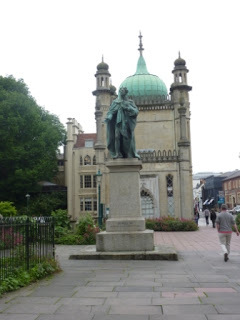
By the way, not everyone holds George IV as he later became, in contempt.
This is a statue of him erected by public subscription in 1828. He was, of course, instrumental in changing Brighton from a small fishing village known as Brighthelmstone. The town itself adored our Prinny for the wealth he brought to their City.
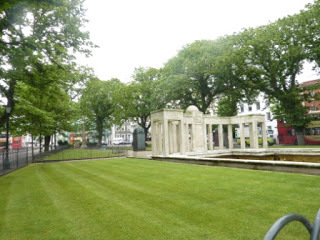
Walking south from the Pavilion you come to Old Stein, where our characters can promenade and strut their stuff in the fashionable quarter of Prinny's Brighton.
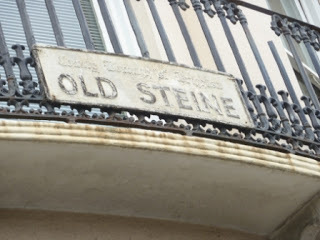 The Old Stein was originally an open green with a stream running through it to the east of the village used by fishermen for the drying of their nets and of course ended at the beach. During our period it was enclosed and became much smaller than when Brighton had been simply Brighhelmston.
The Old Stein was originally an open green with a stream running through it to the east of the village used by fishermen for the drying of their nets and of course ended at the beach. During our period it was enclosed and became much smaller than when Brighton had been simply Brighhelmston.We had a lovely time wandering around the area and I will share more about this next time.....
Published on November 23, 2015 08:00
November 19, 2015
Regency Fashion November 1815
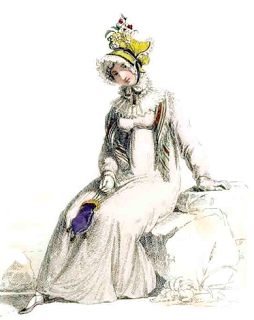 Promenade Dress ~ From Ackermann's November 1815
Promenade Dress ~ From Ackermann's November 1815Here is the description:
A round pelisse made of the Moreno blue striped satin; long loose sleeve, trimmed over the hand with plain satin; a full ruff composed of the finest French cambric, richly ornamented with French work.
A small French shawl of shaded silks thrown carelessly over the shoulders.
A bonnet composed of orange-coloured satin, gipsied with a handkerchief of the same, edged and tied under the chin with Moreno blue satin ribbon; the handkerchief and the rim of the bonnet trimmed with blond lace, and a cluster of wild flowers ornamenting the crown.
Sandals, red or blue morocco. Gloves, York tan.
The shawl looks rather carefully placed to me, but the description makes it sound enchanting, doesn't it?
I love seeing the reticule and although it is not described although it is not described, the colour makes it stand out beautifully, don't you think?
Until next time….
Published on November 19, 2015 08:00
November 16, 2015
Top Pick for the Duke's Daring Debutante
 Night Owl Reviews give a top pick to the Duke's Daring Debutante. So pleased.
Night Owl Reviews give a top pick to the Duke's Daring Debutante. So pleased.Here is a snippet. For the full review click the link below.
"If you are a fan of historical romance I highly recommend you pick this one up. I'm looking forward to many more offerings by this talented author." ~ Night Owl Reviews
All right so it's blowing my own horn, but once in a while is okay, right?
Published on November 16, 2015 08:00
November 10, 2015
Harlequin Blow Out Bonanza
Wow! That ten years went fast!

You will find lots of my books on sale from Harlequin Historicals. Some are short, some are full length. Enjoy

You will find lots of my books on sale from Harlequin Historicals. Some are short, some are full length. Enjoy
Published on November 10, 2015 06:00
November 2, 2015
Regency Fashion November 1815
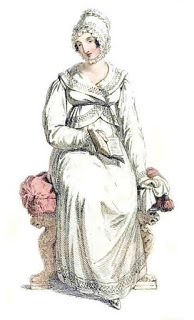 Morning Gown Ackermann's November1815
Morning Gown Ackermann's November1815A FRENCH jacket and petticoat composed of fine cambric muslin;
the petticoat of full walking length, is ornamented at the feet with a broad border of the French work let in, and the fullness of the skirt carried partially round the waist;
the jacket, rounded in front, has a broad cape to correspond, and is trimmed entirely round with French work corresponding with the petticoat; a long bishop sleeve, with French work let in at the wrist.
A French mob cap composed of satin and quilled lace. Slippers, coloured kerseymere. Gloves, York tan.
Not one of my favourites. Perhaps it is the way the jacket looks, however I am pleased to see it called a jacket interestingly enough. And bishop sleeves are different.
Until Next time
Published on November 02, 2015 08:00
October 30, 2015
Fall Back In Time
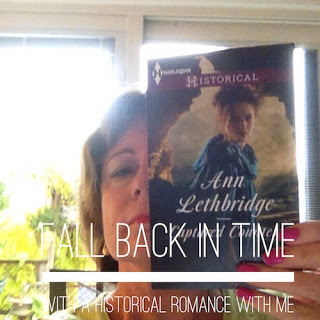 In addition to turning back the clocks, November 1 is also the day when aficionados of Historicalromance novels celebrate #fallbackintime with a picture - it can be you or your cat or your friend -- with a favourite historical romance novel.
In addition to turning back the clocks, November 1 is also the day when aficionados of Historicalromance novels celebrate #fallbackintime with a picture - it can be you or your cat or your friend -- with a favourite historical romance novel.Post it on twitter or Facebook or wherever you hang out with the hashtag #fallbackintime then sit back RT and or share all the posts you see and watch it trend across the internet
Here is my pic from last year to give you the idea. In addition to the hashtag, if you are into social media, you can tag the historical romance networks too:
FB: (@HistoricalRomanceNetwork) https://www.facebook.com/historicalromancenetwork Twitter: (@histromnet) https://twitter.com/histromnet Tumblr: http://historicalromancenet.tumblr.com/
While Europe have already done their clocks, that is no reason not to join in if you love historicals. The more the merrier for this celebration.
Above is the one I did last year so you can see what I mean (I'll be doing a new one for this year). You don't need to add text to the photo, but you do need to put the hashtag in the post to have it show up on Social Media and see it shared around the world.
Join in by retweeting and sharing etc. if you don't want to do a picture of your own. See you on Sunday.
Published on October 30, 2015 08:02
October 27, 2015
Farningham Village, Kent
For such a small place, Farningham has a great many lovely old buildings some of which I thought you might like to take a look at.
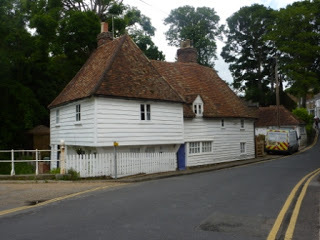 This cottage was once two cottages and they date from the sixteenth century. The one in in the forefront of the picture faces onto the River Darent, actually right on the bank, and if you look closely you can see its ground floor is well below the level of the road. Flooding has been a problem according to recent owners. The basement is no longer in use! These cottages stands at the edge of the bridge over the river from which I took that earlier picture of the cattle screen.
This cottage was once two cottages and they date from the sixteenth century. The one in in the forefront of the picture faces onto the River Darent, actually right on the bank, and if you look closely you can see its ground floor is well below the level of the road. Flooding has been a problem according to recent owners. The basement is no longer in use! These cottages stands at the edge of the bridge over the river from which I took that earlier picture of the cattle screen.
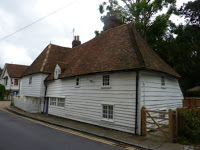
Here is a view from the other side.
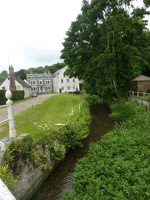
Here is a view of the ancient Farningham Mill. It is about to become apartments and homes so will not look like this for much longer.
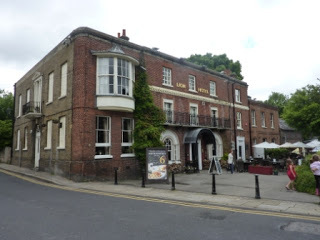
There has been an inn at this point where the road crosses the River Darent for centuries. While it is now called Lion Hotel in our period it was the Black Lion. It was used as both a watering hole for horses and people as well as a meeting place for the village.
Who can resist such an interesting name for a street. And the reason behind it. It was the lane people used to avoid the toll road and thus - spare (or save) a penny. Now shortcuts are always good places for heroes and heroines to come a cropper. Oh, and this is not the only so named lane, there is one in Eynesford too.
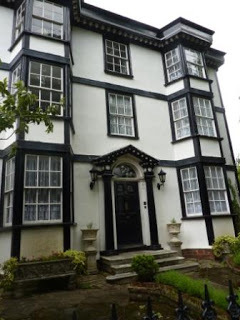
Finally a home labelled on the gate as The White House and indicated as being built in 1743. A local history notes it as being built for a surgeon. He must have been doing very well indeed.
Until next time..................
 This cottage was once two cottages and they date from the sixteenth century. The one in in the forefront of the picture faces onto the River Darent, actually right on the bank, and if you look closely you can see its ground floor is well below the level of the road. Flooding has been a problem according to recent owners. The basement is no longer in use! These cottages stands at the edge of the bridge over the river from which I took that earlier picture of the cattle screen.
This cottage was once two cottages and they date from the sixteenth century. The one in in the forefront of the picture faces onto the River Darent, actually right on the bank, and if you look closely you can see its ground floor is well below the level of the road. Flooding has been a problem according to recent owners. The basement is no longer in use! These cottages stands at the edge of the bridge over the river from which I took that earlier picture of the cattle screen.
Here is a view from the other side.

Here is a view of the ancient Farningham Mill. It is about to become apartments and homes so will not look like this for much longer.

There has been an inn at this point where the road crosses the River Darent for centuries. While it is now called Lion Hotel in our period it was the Black Lion. It was used as both a watering hole for horses and people as well as a meeting place for the village.
Who can resist such an interesting name for a street. And the reason behind it. It was the lane people used to avoid the toll road and thus - spare (or save) a penny. Now shortcuts are always good places for heroes and heroines to come a cropper. Oh, and this is not the only so named lane, there is one in Eynesford too.

Finally a home labelled on the gate as The White House and indicated as being built in 1743. A local history notes it as being built for a surgeon. He must have been doing very well indeed.
Until next time..................
Published on October 27, 2015 08:28
October 22, 2015
Ancient Structure, Farningham in Kent
Today we stop in the ancient village of Farningham in Kent.
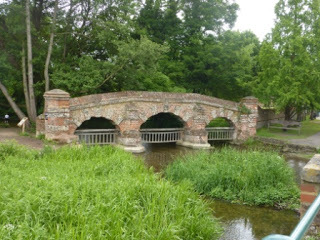 Because the village is near where I grew up, I was surprised I hadn't noticed this particular structure crossing the River Darenth before.
Because the village is near where I grew up, I was surprised I hadn't noticed this particular structure crossing the River Darenth before.What is it?
Did you guess a bridge? No. I took the picture from the bridge.
Guess again.
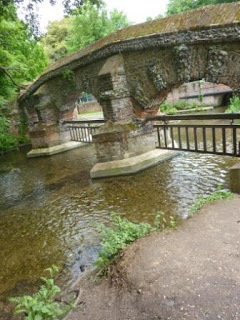
Yes this is indeed taken from the other side. As you can clearly see from this angle there is no place to cross. Could it be one remaining wall of a medieval bridge?
There is nothing to suggest it once tied in to another structure at all. It puzzled the experts for years.
Do you give up?
All right, humor me, it's Thursday and my edits are just about done.
What if I said it has something to do with cows?
I expect you have either googled it, or figured it out by now.
The function of this structure is to serve as a cattle screen. That is to stop cows from the adjoining field who use the river to drink or who crossed at the ford here, from wandering downstream and ending up where they were not supposed to be when the climbed out again. They might have ended up wandering around Farningham village, or wandering along the road where the traffic would have been busy.
This extraordinarily ornate structure for such a mundane purpose was built between 1740 and 1770 when the Hanger family owned Farningham Manor. It was a testament to the wealth of the family at this time.
In the 1800's the Darenth River was known as one of the finest trout streams in England and Charles Dicken's is known to have fished it. It is very shallow at this point, and likely because it could be forded here, it was the reason for the village being established at this point. The water is also lovely and clear and fishing does not seem at all out of the realm of possibility. A lovely location for setting a scene in a story.
Until next time................
Published on October 22, 2015 08:30




